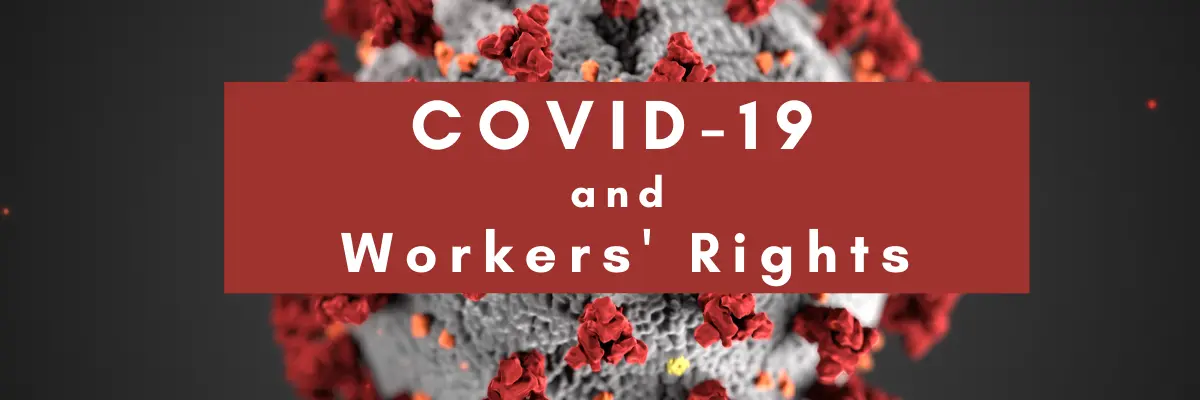
Returning to Work Safely After The Pandemic
June 11, 2020
How Can Workers Prioritize Safety Without Stronger Employment Protections?
By Gabriel Tejada
COVID-19 and Workers’ Rights Series
The COVID-19 and Workers’ Rights series will publish essays from current and incoming students at some of the top law schools in the country. These essays, submitted for the Charles E. Joseph Employment Law Scholarship, look at the pandemic from the perspective of workers’ rights.
The COVID-19 global pandemic has brought to light just how fragile our workplace structures are and will make them even more so. Millions of workers are out of work and afraid to go outside. The biggest challenge workers face today and tomorrow is how will we return to work safely.
The instinct to protect oneself and one’s family has put life on pause. We can stomach close quarters and boredom with the knowledge that we are helping the greater good. What happens when the numbers tick down? How can we trust that our workplaces will not be the next epicenter?
The politics that have defined our times have left us untrusting, skeptical, and bitter. The workplace social contracts where we once agreed to put aside differences to achieve common goals could leave us at odds with self-preservation if we do not know for certain that the people at work are not carrying the virus. Until there are tests readily available, that can produce reliable results, or a vaccine that staggers COVID’s ability to spread, how do we return to the office safely?
So we will wait it out, we tell ourselves. The President of the United States called this global pandemic “a hoax” and admitted that he attempted to manufacture hope by “playing down” the threat. Regardless of political affiliation, that is not something a trustworthy leader does.
Every CDC official will tell you that the number one tool that is needed in times of global pandemics is trust. When the President of the United States tells us that we cannot trust voting by mail because of a fear for fraud, and Wisconsin’s Supreme Court decided that voters should go out to voting booths in the middle of a state-wide stay-at-home-order (not delay the election and not vote by mail), there is no faith in the belief that our elected officials are acting in the interest of public safety.
If our elected officials are not acting in the interest of our public safety, and are responsible for our transition out of this global pandemic, how do we return to our jobs safely?
At some point, everyone will just go back to work–that is, if they haven’t been working all along, either out of desperation or being deemed essential. It is not clear when, but at some point we can’t just stay at home anymore.
We will be expected to return. We will listen to our employers, and when they say it is time, we will go back to work. Employers don’t have the means to know that their employees took proper precautions when they were out of the office.
Still, they are the ones that write our checks, and the bills are due. We are thankful for the checks. We are thankful for the routine. We are happy to be back at work, having survived this episode, some of us paid to stay at home. Our credit cards accrued interest and our credit scores took hits. We were sick of the TV telling us that the world is on fire, and we realized our interest in our hobbies have diminished. The kids are finally back in school so that they too can eventually get jobs, because they need to save up in case the worst happens.
This is why we went back to work.
Reflections from Charles Joseph
Even before the pandemic, 40% of American workers couldn’t afford a $400 unexpected bill. Wage theft costs workers billions in wages every year. The situation has only gotten worse with tens of millions of newly unemployed workers. As Gabriel Tejada reminds us, many workers can’t afford not to go back to work, whether it’s safe or not. Our current protections fall far short of what’s needed. In New York, whistleblower laws protect workers who report dangerous conditions at work, and retaliation laws protect employees from being fired for reporting safety violations. But without stronger protections, millions will continue to suffer.
Gabriel Tejada graduated from the University of Massachusetts, Amherst and currently works at the New Horizon Counseling Center. He received the Segal Americorps Education Award for National Service and plans to attend the St. John’s University School of Law in fall 2020.
Charles Joseph has over two decades of experience as an NYC employment lawyer. He is the founder of Working Now and Then and the founding partner of Joseph and Kirschenbaum, a firm that has recovered over $140 million for clients.